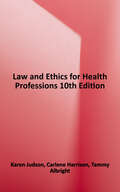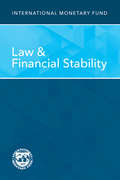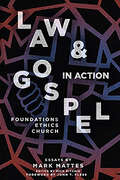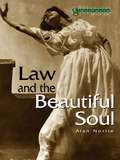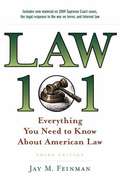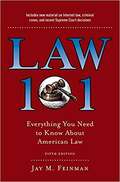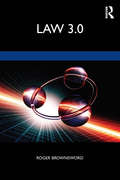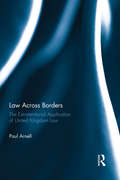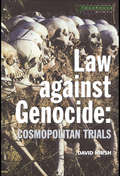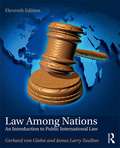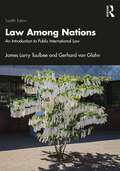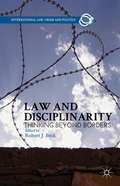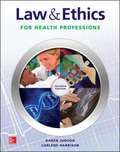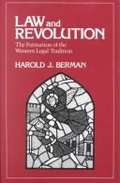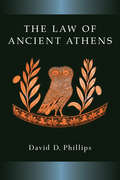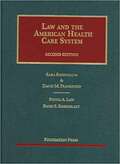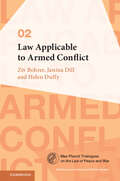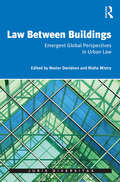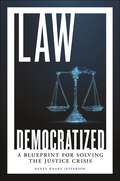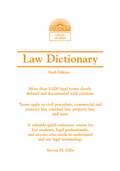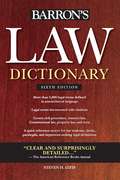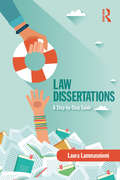- Table View
- List View
Law & Ethics for Health Professions
by Karen Judson Carlene Harrison Tammy AlbrightLaw and Ethics for Health Professions explains how to navigate the numerous legal and ethical issues that healthcare professionals face every day. Topics are based upon real-world scenarios and dilemmas from a variety of health care practitioners.
Law & Financial Stability: Restoring Financial Stability--the Legal Response (Seminar Volumes Ser. #6)
by International Monetary FundA report from the International Monetary Fund.
Law & Gospel in Action: Foundations, Ethics, Church
by Mark C MattesMark Mattes' hope is not only to secure believers' consciences in Christ but also to reclaim theological and social turf which mainline Protestants have too quickly ceded to various secular agendas. The collected essays engage the reality of believers' death and resurrection in Christ, and how that bears upon the life of faith while also attending to a wide range of relevant theological topics such as scriptural authority, apologetics, a critique of contemporary mainline Protestant and Evangelical Catholic ethics, a critique of Lutheran-Reformed ecumenism, and the church's mission and outreach. The collection concludes with several sermons based on Old Testament lessons seeking to show how the theology embedded in the essays can be used for proclamation.
Law & the Beautiful Soul
by Alan NorrieStarting from concrete legal issues, Alan Norrie develops a critical vision of law in its relation to morality and socio-historical context. Traced historically, the conflicts he describes can be read today in law's treatment of legality and justice, judgment and responsibility. Joint winner of the Hart / Socio-Legal Studies Association Book Prize 2006.
Law 101
by Brien A. RocheA solid reference for both the everyday and the unexpected legal issues, written by practicing attorneys Law 101 is an essential reference that explains: How laws are made How the court system works How each area of the law impacts your daily life Key information for important questions: How does a lawsuit begin? How do civil and criminal law differ? When do state laws trump federal laws? What makes a contract solid? What can you expect if called as a juror? What can you expect if called as a witness? And other complex areas of the law that you need to know. No home reference shelf is complete without this indispensible guide. The new edition also includes information on legal subjects that have become more important recently, including alternative dispute resolution, privacy rights, and Internet law.
Law 101: Everything You Need To Know About American Law
by Jay M. FeinmanLaw is everywhere. Every day, the news features a notorious criminal trial, a massive lawsuit, or a new constitutional claim. But it all seems so complicated. In a book brimming with legal puzzles, interesting anecdotes, thought-provoking questions, and intellectual stimulation, Jay M. Feinman offers a delightfully clear introduction to law, giving us a solid understanding of the American legal tradition, and covering the main subjects taught in the first year of law school. Readers are introduced to every aspect of the legal system, including constitutional law, the litigation process, personal injury law, contract law, property law, and criminal law. Feinman illuminates each discussion with many intriguing, outrageous, and infamous cases, from the sensational murder trial in Victorian London that led to the legal definition of insanity, to the epochal decision in Marbury v. Madison that gave the Supreme Court the power to declare state and federal laws unconstitutional, to theinfamous McDonald's hot coffee case. He broadens the reader's legal vocabulary, clarifying the meaning of everything from "due process" and "equal protection" in constitutional law, to the distinction between "murder" and "manslaughter" in criminal law. This third edition has been fully updated throughout, and incorporates the most recent developments in the American legal system, including new material on 2009 Supreme Court cases, the legal response to the war on terror (such as the Guantanamodetainees and electronic surveillance), and new and updated material on law on the Internet. Everyone who wants a better grasp of current legal issues, including ordinary citizens, students contemplating law school, and journalists covering the legislature or the courts, will find here a wonderful source of information - a complete, clear, and colorful map of the American legal system.
Law 101: Everything You Need To Know About American Law
by Jay M. FeinmanMost of us know very little about the law. We pick up bits of information from television and newspaper accounts of current legal battles, and from bestselling novels and popular movies. But these pieces do not give us an accurate or complete picture. In Law 101 , Jay M. Feinman offers a delightfully clear introduction to law, covering the main subjects found in the first year of law school and giving us a basic understanding of the American legal tradition. Readers are introduced to every aspect of the legal system, from constitutional law and the litigation process to tort law, contract law, property law, and criminal law. Feinman illuminates each discussion with many intriguing, outrageous, and infamous cases, from the scalding coffee case that cost McDonald's half a million dollars, to the sensational murder trial in Victorian London that led to the legal definition of insanity, to the epochal decision in Marbury v. Madison that gave the Supreme Court the power to declare state and federal laws unconstitutional. He broadens the reader's legal vocabulary, clarifying the meaning of everything from "due process" and "equal protection" in constitutional law, to the distinction between "murder" and "manslaughter" in criminal law. Perhaps most important, we learn that law is voluminous and complex, but accessible to everyone. Anyone who enjoys Court TV will find this book irresistible. Everyone who wants a better grasp of current legal issues, from students contemplating law school to journalists covering the legislature or the courts, will find here a wonderful source of information--a complete, clear, and colorful map of the American legal system.
Law 3.0: Rules, Regulation, and Technology
by Roger BrownswordPutting technology front and centre in our thinking about law, this book introduces Law 3.0: the future of the legal landscape. Technology not only disrupts the traditional idea of what it is ‘to think like a lawyer,’ as per Law 1.0; it presents major challenges to regulators who are reasoning in a Law 2.0 mode. As this book demonstrates, the latest developments in technology offer regulators the possibility of employing a technical fix rather than just relying on rules – thus, we are introducing Law 3.0. Law 3.0 represents, so to speak, the state we are in and the conversation that we now need to have, and this book identifies some of the key points for discussion in that conversation. Thinking like a lawyer might continue to be associated with Law 1.0, but from 2020 onward, Law 3.0 is the conversation that we all need to join. And, as this book argues, law and the evolution of legal reasoning cannot be adequately understood unless we grasp the significance of technology in shaping both legal doctrine and our regulatory thinking. This is a book for those studying, or about to study, law – as well as others with interests in the legal, political, and social impact of technology.
Law Across Borders: The Extraterritorial Application of United Kingdom Law
by Paul ArnellThis book examines the application of UK Criminal and Human Rights Law to people and circumstances outside the United Kingdom. Building upon previous analyses which have focused on a single aspect of extraterritorially, this book examines the fields of Criminal and Human Rights law as the two main areas of non-private law which are frequently applied across borders. Both fields are placed in context before being drawn together in a coherent and systematic way. The book examines recent law and practice, as well as historic developments and explores the concept of enforcement. The author’s analysis includes coverage of topics such as the criminalisation of sex-tourism, the extradition of white-collar criminals and the application of human rights law to Iraq following American and British intervention in the region. Law Across Borders goes on to point the way forward in the development of the extraterritorial application of public law, and suggests ways in which greater coherence can be achieved. This book will be of particular interest to practitioners, academics and scholars of International Law, Human Rights Law and Criminal Law. It is unique in its ambition to offer a comprehensive description and analysis of the extra-territorial application of UK Human Rights Law and Criminal Law in a single text.
Law Against Genocide: Cosmopolitan Trials
by David HirshBringing a sociologist's insight to legal institutions and narratives, this book is an innovative and timely sociological contribution to current concerns regarding critical cosmopolitanism, human rights and crimes against humanity.
Law Among Nations: An Introduction to Public International Law
by Gerhard Von Glahn James Larry TaulbeeOffering a more accessible alternative to casebooks and historical commentaries, Law Among Nations explains issues of international law by tracing the field's development and stressing key principles and processes. This comprehensive text eliminates the need for multiple books by combining discussions of theory and state practice with excerpts from landmark cases. Renowned for its rigorous approach and clear explanations, Law Among Nations remains the gold standard for undergraduate introductions to international law. Learning Goals Trace the development of International Law through key principles and processes. Illustrate important issues and theories using excerpts from landmark cases.
Law Among Nations: An Introduction to Public International Law
by Gerhard Von Glahn James Larry TaulbeeOffering a more accessible alternative to casebooks and historical commentaries, Law Among Nations explains issues of international law by tracing the field's development and stressing key principles, processes, and landmark cases. This comprehensive text eliminates the need for multiple books by combining discussions of theory and state practice with excerpts from landmark cases. The book has been updated in light of the continuing revolution in communication technology, the dense web of linkages between countries that involve individuals and bodies both formal and informal; and covers important and controversial areas such as human rights, the environment, and issues associated with the use of force. Renowned for its rigorous approach and clear explanations, Law Among Nations remains the gold standard for undergraduate introductions to international law. New to the Eleventh Edition Added or expanded coverage of timely issues in international law: Drones and their use in the air and in space Immigration Islamic views of international law Inviolability and the difference between diplomatic immunity and sovereignty, in light of the Benghazi attack Thoroughly rewritten chapters in areas of great change: International criminal law Just war and war crime law New cases, statutes, and treaties on many subjects
Law Among Nations: An Introduction to Public International Law
by James Larry Taulbee Gerhard von GlahnOffering a more accessible alternative to casebooks and historical commentaries, Law Among Nations explains issues of international law by tracing the field’s development and stressing key principles, processes, and landmark cases. This comprehensive text eliminates the need for multiple books by combining discussions of theory and state practice with excerpts from landmark cases. The book has been updated in light of the continuing revolution in communication technology; the dense web of linkages between countries that involve individuals and bodies both formal and informal; and important and controversial areas such as human rights, the environment, and issues associated with the use of force. Renowned for its rigorous approach and clear explanations, Law Among Nations remains the gold standard for undergraduate introductions to international law. New to the Twelfth Edition Added or expanded coverage of timely issues in international law: Drones and their use in the air and in space Outer space Cybercrime and responses The Julian Assange Case Environmental law Expanded discussion of space law Expanded discussion of conflict and non-state actors Final cases in the ICTY Thoroughly rewritten chapters on areas of great change: International Criminal Law Just War and War Crime Law International Economic Law (newly restored in response to reviews) International Environmental Law New cases, statutes, and treaties on many subjects
Law And Ardor
by Ralph McinernyAndrew Broom is pleased to be working on an investigation in which he can combine a visit to the crime scene with a quick nine holes. But-
Law And Disciplinarity
by Robert J. BeckIn the twenty-first century, traditional legal borders both geographic and intellectual have been increasingly contested. Many observers have questioned whether the long-held conceptions of sovereign state boundaries remain salient in a world of technology-accelerated transnational flows of people, capital, and information. Meanwhile, scholars across the social sciences and humanities have begun crossing disciplinary borders in unprecedented ways, co-opting new methodologies and engaging in meaningful and sustained dialogue about the meaning of law in its changing global context. These emerging movements prompt important questions: what are the nature and implications of shifting legal borders? What does the future hold for them? What role do new technologies play in this evolving story? Law and Disciplinarity: Thinking beyond Borders sets forth to answer these questions by way of distinguished scholars drawn from across a wide range of disciplines, including law, political science, international relations, and communications. "
Law And Ethics: For The Health Professions (7th Edition)
by Karen Judson Carlene HarrisonLaw and Ethics for the Health Care Professions illustrates the numerous legal and ethical issues that health care professionals face every day. The topics are derived from real-life experiences and dilemmas from a variety of health care practitioners. Through the use of Learning Outcomes, Key Terms, Ethics Issues, Chapter Reviews, Case Studies, Internet Activities, Court Cases, and Video Vignettes, students hear from health care practitioners in various locations throughout the United States as they encounter legal and ethical problems and situations. Students will practice critical thinking skills to decide how to resolve the real-life situations or theoretical scenarios, determine why the court made a particular ruling and decide how the issues are relevant to the health care profession they will practice.
Law And Revolution: The Formation Of The Western Legal Tradition
by Harold BermanThe roots of modern Western legal institutions and concepts go back nine centuries to the Papal Revolution, when the Western church established its political and legal unity and its independence from emperors, kings, and feudal lords. Out of this upheaval came the Western idea of integrated legal systems consciously developed over generations and centuries. Harold J. Berman describes the main features of these systems of law, including the canon law of the church, the royal law of the major kingdoms, the urban law of the newly emerging cities, feudal law, manorial law, and mercantile law. In the coexistence and competition of these systems he finds an important source of the Western belief in the supremacy of law. Written simply and dramatically, carrying a wealth of detail for the scholar but also a fascinating story for the layman, the book grapples with wideranging questions of our heritage and our future. One of its main themes is the interaction between the Western belief in legal evolution and the periodic outbreak of apocalyptic revolutionary upheavals. Berman challenges conventional nationalist approaches to legal history, which have neglected the common foundations of all Western legal systems. He also questions conventional social theory, which has paid insufficient attention to the origin of modem Western legal systems and has therefore misjudged the nature of the crisis of the legal tradition in the twentieth century.
Law And Society In The Ancient World: Law Of Ancient Athens
by David PhillipsThe Law of Ancient Athens contains the principal literary and epigraphical sources, in English, for Athenian law in the Archaic and Classical periods, from the first known historical trial (late seventh century) to the fall of the democracy in 322 BCE. This accessible and important volume is designed for teachers, students, and general readers interested in the ancient Greek world, the history of law, and the history of democracy, an Athenian invention during this period. Offering a comprehensive treatment of Athenian law, it assumes no prior knowledge of the subject and is organized in user-friendly fashion, progressing from the person to the family to property and obligations to the gods and to the state. David D. Phillips has translated all sources into English, and he has added significant introductory and explanatory material. Topics covered in the book include homicide and wounding; theft; marriage, children, and inheritance; citizenship; contracts and commerce; impiety; treason and other offenses against the state; and sexual offenses including rape and prostitution. The volume’s unique feature is its presentation of the actual primary sources for Athenian laws, with many key or disputed terms rendered in transliterated Greek. The translated sources, together with the topical introductions, notes, and references, will facilitate both research in the field and the teaching of increasingly popular courses on Athenian law and law in the ancient world.
Law And The American Health Care System, 2d (University Casebook Ser.)
by Sara Rosenbaum David Frankford Sylvia Law Rand RosenblattLaw and the American Health Care System (University Casebook Series) 2nd Edition
Law Applicable to Armed Conflict (Max Planck Trialogues #2)
by Janina Dill Helen Duffy Ziv BohrerWhich law applies to armed conflict? This book investigates the applicability of international humanitarian law and international human rights law to armed conflict situations. The issue is examined by three scholars whose professional, theoretical, and methodological backgrounds and outlooks differ greatly. These multiple perspectives expose the political factors and intellectual styles that influence scholarly approaches and legal answers, and the unique trialogical format encourages its participants to decenter their perspectives. By focussing on the authors' divergence and disagreement, a richer understanding of the law applicable to armed conflict is achieved. The book, firstly, provides a detailed study of the law applicable to armed conflict situations. Secondly, it explores the regimes' interrelation and the legal techniques for their coordination and prevention of potential norm conflicts. Thirdly, the book moves beyond the positive analysis of the law and probes the normative principles that guide the interpretation, application and development of law.
Law Between Buildings: Emergent Global Perspectives in Urban Law (Juris Diversitas)
by Nestor Davidson Nisha MistryThe rich field of urban law has thus far lacked a holistic and concerted scholarly focus on comparative and global perspectives. This work offers new inroads into the global and comparative streams within urban law by presenting emerging frameworks and approaches to topics ranging from urban housing and land use to legal informality and consumer financial protection. The volume brings together a group of international urban legal scholars to highlight emergent global, interdisciplinary perspectives within the field of urban law, particularly as they have import for comparative legal analysis. The book presents a timely addition to the literature given the urgent legal issues that continue to surface in an age of rapid urbanization and globalization.
Law Democratized: A Blueprint for Solving the Justice Crisis
by Renee Knake JeffersonA practical plan for providing legal help to all, regardless of resourcesMillions of people in the United States face legal problems without lawyers to help them. Why? How do we educate and inform the public about the law so they can understand when the services of a lawyer are necessary or desirable? When can individuals solve legal problems on their own or with the assistance of a specialist without a traditional law degree? In short, how do we democratize the law?Law Democratized offers a blueprint to increase legal help for everyone, regardless of their ability to pay. Building on more than a decade of research into innovation in legal services, the book advances a series of recommendations inspired by success stories from around the globe. Renee Knake Jefferson outlines different paths pursued by bar associations, courts, entrepreneurs, law schools, nonprofits, and others, evaluating the promise and pitfalls of each. She analyzes regulatory reforms employed in other nations, along with emerging efforts in a handful of US states.If the rule of law is the bedrock that American democracy rests upon, then the justice transformed system must be open and user-friendly to all. Law Democratized makes a compelling argument for transforming the American legal landscape through engaged citizenship, ethical innovation, expanded education, and regulatory reform, in order to democratize law and make legal help more accessible.
Law Dictionary, (Mass Market) 6th Ed.: Mass Market Edition
by Steven H. GifisA Simon & Schuster eBook. Simon & Schuster has a great book for every reader.
Law Dictionary, (Trade) 6th Ed: Mass Market Edition
by Steven H. GifisA Simon & Schuster eBook. Simon & Schuster has a great book for every reader.
Law Dissertations: A Step-by-Step Guide
by Laura LammasniemiLaw Dissertations: A Step-by-Step Guide provides you with all the guidance and information you need to complete and succeed in your LLB, LLM or law-related dissertation. Written in a simple, clear format and with plenty of tools to help you to put the theory into practice, Laura Lammasniemi will show you how to make writing your law dissertation easy, without compromising intellectual rigour. As well as explaining the process of research and outlining the various legal methodologies, the book also provides practical, step-by-step guidance on how to formulate a proposal, research plan, and literature review. Unlike other law research skills books, it includes a section on empirical research methodology and ethics for the benefit of students who are studying for a law-related degree. Packed full of exercises, worked examples and tools for self-evaluation, this book is sure to become your essential guide, supporting you on every step of your journey in writing your law dissertation.
